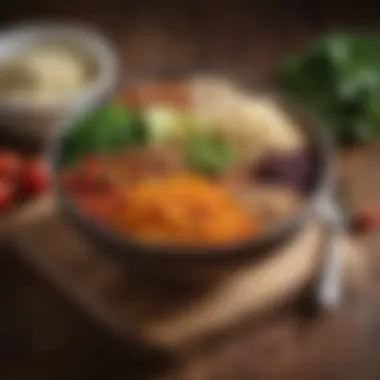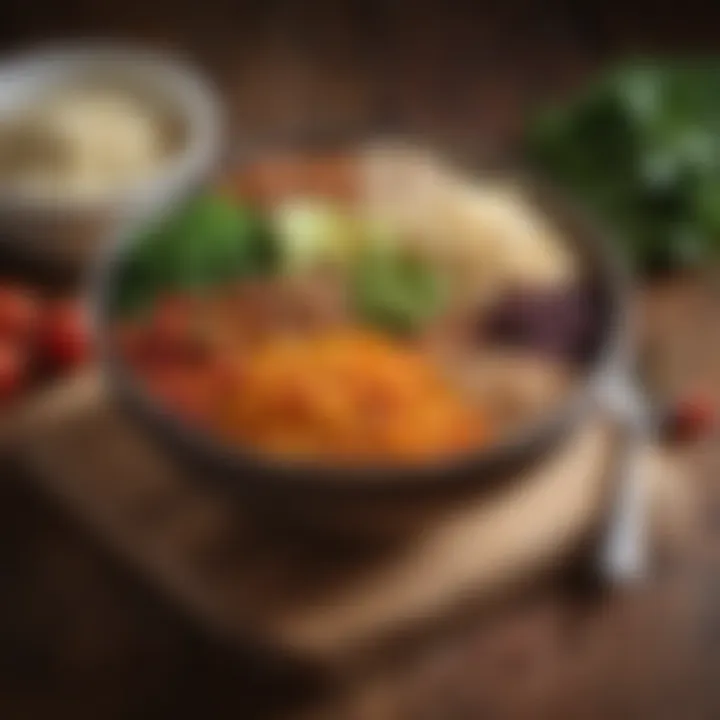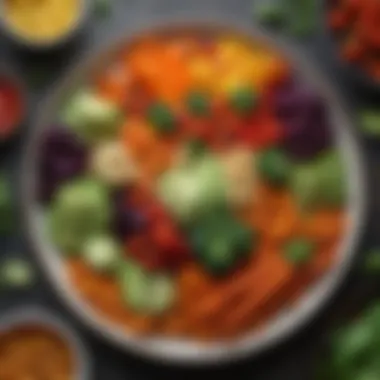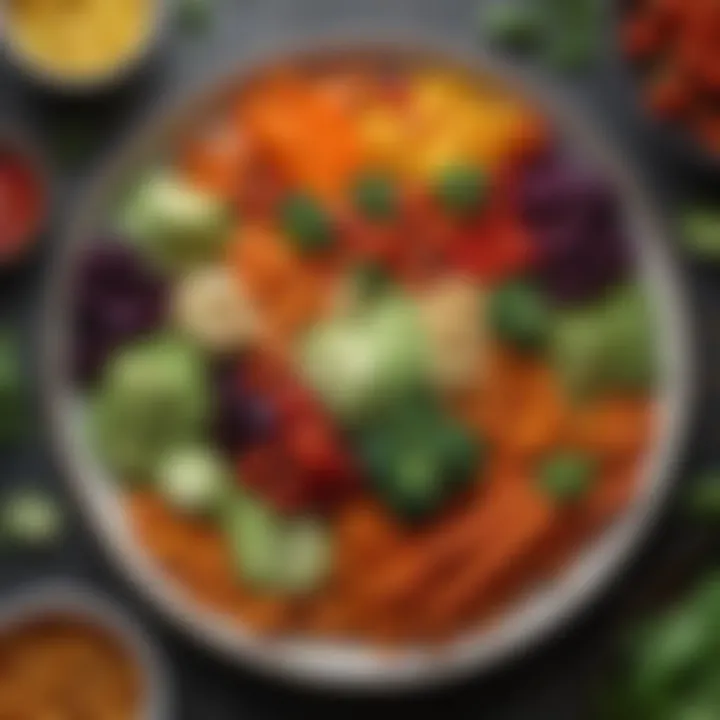Vegetarian Bulking Recipes for Muscle Gain


Intro
As the trend of plant-based diets continues to gain traction, many individuals are exploring not just the health benefits but also how these diets can support specific fitness goals, particularly bulking. Vegetarian bulking recipes are not just mere substitutions for traditional meat-based meals; they are a vibrant array of options crafted to meet the caloric and nutritional demands of those looking to build muscle.
This guide focuses on providing culinary enthusiasts with a rich selection of vegetarian recipes tailored for bulking. You’ll find that meatless does not mean flavorless or nutrient-poor. By integrating an assortment of protein-dense ingredients and creative cooking methods, anyone can embark on a journey to elevate their meals in support of muscle gain and improved health.
Throughout this article, we’ll delve into various recipe categories that encompass wholesome ingredients, preparation techniques, and cooking tips. Whether you're pressed for time, need quick meal solutions, or aim to impress with culinary flair, there’s something here for every palate and schedule. This is more than just filling up on carbs; it’s about crafting meals that fuel your body effectively.
Let's explore the world of vegetarian bulking, uncovering strategies that fit seamlessly within your busy life while promoting strength and endurance.
Understanding Bulking and Vegetarian Nutrition
Understanding how bulking works, especially in the context of a vegetarian diet, is crucial for anyone looking to increase muscle mass without compromising their values. Bulking isn't just about eating more; it's about eating the right kinds of foods to support muscle synthesis. For vegetarians, this often means focusing on nutrient-dense ingredients that provide sufficient energy and protein, while also being mindful of macronutrient ratios.
The Concept of Bulking
Bulking refers to a phase where individuals increase their calorie intake to support muscle growth. It's not merely about piling on food; it's a calculated approach that incorporates sufficient proteins, carbohydrates, and fats to promote healthy weight gain and muscle development. The goal here is to provide your body with extra calories that it can utilize for muscle repair and growth following strenuous workouts. This approach is typically paired with a strength training program, ensuring that those extra calories are converted into muscle rather than just fat.
Nutritional Needs for Muscle Gain
When bulking, the focus should shift towards achieving a calorie surplus, which means consuming more calories than the body burns. However, it’s essential to ensure that this surplus comes from quality sources. A diverse intake including protein, healthy fats, and ample carbohydrates is necessary. This balance not only supports muscle gain but also contributes to overall health, assisting with recovery and maintaining energy levels throughout the day.
Key Nutrients in a Vegetarian Diet
To effectively bulk as a vegetarian, understanding key nutrients is important. Each macronutrient plays a vital role in muscle building and recovery:
Proteins
Proteins are the building blocks of muscle. They contribute significantly to muscle repair and growth, making them absolutely essential in a bulking diet. While many associate protein primarily with animal products, vegetarian sources like lentils, chickpeas, and tofu pack a punch. It's essential to consume a variety of these sources to ensure all necessary amino acids are available for muscle synthesis. A common oversight is depending solely on a narrow range of protein, which can limit the effectiveness of gains.
Carbohydrates
Carbohydrates serve as the body's primary energy source. During the bulking phase, it’s advantageous to emphasize complex carbs such as whole grains, legumes, and starchy vegetables. Not only do they provide a steady release of energy for workouts, but they also aid in recovering glycogen stores post-exercise. A noteworthy feature is their ability to spare protein from being used as energy, allowing it to focus on building muscle instead.
Fats
Fats often get a bad rap, but they are crucial for hormone production, including hormones that promote muscle growth, like testosterone. Incorporating sources of healthy fats, such as nuts, seeds, and avocados, can help in reaching higher calorie goals without needing to consume massive volumes of food. However, it's wise to focus on unsaturated fats instead of saturated fats for better health outcomes.
Vitamins and Minerals
Vitamins and minerals play a supporting role in various bodily functions, from energy production to immune health. Certain vitamins, like B vitamins, assist in energy metabolism, while minerals like zinc and magnesium are essential for muscle contraction and recovery. Pay attention to leafy greens, fruits, and whole grains to cover these necessary micronutrients in your bulking plan. A well-rounded intake of these nutrients can elevate the effectiveness of your dietary efforts during the bulk phase.
"Nutrition is not just about eating; it’s about learning to live a healthy life with intentional choices."
In summary, understanding the foundational concepts of bulking and vegetarian nutrition intertwines the science of macronutrients with practical dietary choices. Each element, whether it be protein from different plant sources or the right kind of fats, adds to the overall experience and success of a vegetarian bulking journey.
Essential Ingredients for Vegetarian Bulking
When it comes to vegetarian bulking, understanding the essential ingredients can make a world of difference. Unlike diets focused solely on meat, a plant-based approach requires a thoughtful selection of foods that monitor not just calorie intake but the types of nutrients consumed. A well-rounded vegetarian diet can support muscle growth, increased strength, and overall health provided you include the right ingredients. Here, we delve into high-protein sources, healthy carbohydrates, and beneficial fats—key players in any vegetarian bulking strategy.
High-Protein Sources
Lentils
Lentils often sit at the top of the list for vegetarian protein sources. These legumes deliver a punch with about 18 grams of protein per cooked cup, making them an excellent addition to any bulking meal plan. One standout feature of lentils is their fiber content, which not only supports digestion but can also help keep you feeling full for longer periods. While they're generally an affordable choice, some may find their drying process a bit lengthy, requiring soaking and cooking. But for those ready to invest a little time, lentils are a hearty, nutritious component of meals like soups or stews, and can be easily mashed into patties for burgers.
Quinoa
Quinoa, hailed as a superfood, is unique because it's one of the few plant sources considered a complete protein, containing all nine essential amino acids. This ancient grain not only boasts around 8 grams of protein per cooked cup but also provides a balance of carbohydrates that helps replenish energy stores following a workout. Moreover, quinoa is gluten-free, making it suitable for those with gluten sensitivities. However, some may find its texture unusual, especially if used in place of rice or couscous. Overall, it’s a versatile grain that can be served warm in salads or as a side dish.
Chickpeas


Chickpeas, also known as garbanzo beans, are another fantastic protein source with roughly 15 grams per cooked cup. These little gems are incredibly versatile, finding their way into everything from curries to salads, and being the key ingredient in hummus. The fiber in chickpeas aids in digestion, supporting gut health. However, if someone isn’t mindful, they can be prone to gas, particularly when consumed in large quantities. That said, their creamy texture when blended makes them a staple for dips and spreads, providing a satisfying and protein-rich snack.
Tofu and Tempeh
When discussing plant-based proteins, tofu and tempeh get a lot of love. Tofu, made from soy milk, is a flexible ingredient, taking on flavors of spices and marinades. A half-cup serving grants about 10 grams of protein, alongside various bioactive compounds beneficial for your health. Tempeh, fermented soybeans, offers an even denser protein punch with about 15 grams per half-cup, plus additional probiotics that can aid gut flora. A consideration is their texture; while some love the soft silkiness of tofu, others may prefer tempeh’s more robust chew. Both can stand alone in stir-fries or be integrated into wraps.
Healthy Carbohydrates
Whole Grains
Whole grains are arguably the backbone of a vegetarian bulking diet. They are rich in complex carbohydrates, which fuel workouts and help to maintain energy levels. Varieties such as brown rice, barley, and farro not only provide energy but also come packed with important nutrients, including B vitamins and minerals. They’re also great sources of fiber. Nevertheless, they can take longer to cook compared to refined grains, but the extra time is often worth it for the health benefits they offer. Think grain bowls or hearty salads to easily incorporate these into meals.
Vegetables
Vegetables are often underappreciated when it comes to bulking diets. They might not provide the calorie density of legumes or grains, but their role in providing vitamins, minerals, and antioxidants cannot be understated. Leafy greens, for instance, are low in calories yet high in essential nutrients. Including a rainbow of vegetables can help keep meals interesting and nutrient-dense; however, not all veggies are calorie-rich. Roasting vegetables can enhance their flavor profile and make them more appealing while keeping their nutrient density intact.
Fruits
Fruits might sometimes get a bad rap in bodybuilding circles due to sugar content, but they offer significant benefits. High in vitamins and minerals, fruits like bananas, berries, and avocados are excellent additions to any bulking regimen. A medium banana can provide quick energy, especially great for post-workout recovery. Despite their advantages, caution is needed with portion sizes due to sugars. Yet fresh fruits can easily fit into a snack routine, adding valuable nutrients with a natural sweetness that many crave.
Beneficial Fats
Nuts and Seeds
Nuts and seeds are often calorie-dense and help maintain a balanced vegetarian diet. They're rich in healthy fats, providing a combination of omega-3 and omega-6 fatty acids, crucial for inflammatory response and overall cardiovascular health. Almonds, walnuts, chia seeds, and flaxseeds can easily be added to meals or snacks, boosting caloric intake efficiently. However, moderation is key, as it is easy to overindulge. Their crunch can elevate salads or serve as a satisfying crunchy topping for many dishes.
Avocado
Avocado has become a superstar in the health community. This creamy fruit is rich in monounsaturated fats, essential for healthy hormone production—a necessary component for anyone looking to bulk up. A single avocado can contain around 300 calories, making it a dense source of nutrition. It can be added to sandwiches, salads, or smoothies for added creaminess. Some may find its texture off-putting, though, which can make it tricky for some diners.
Olive Oil
Olive oil has a place of honor in most kitchens for a reason. Rich in healthy fats, it can help to improve heart health and is a staple in Mediterranean diets. A tablespoon yields 120 calories, making it easy to elevate a dish’s caloric content without excessive bulk. Beyond its health benefits, it also adds a depth of flavor to dishes. That being said, its flavor can vary based on quality, and while it’s best used in dressings or finishing touches, frying might not give the best flavor outcome. Proper storage matters too, as exposure to light can degrade its quality over time.
"Incorporating these essential ingredients can truly elevate your vegetarian bulking journey."
Choosing the right mix of these ingredients not only ensures you're fueling your body but also broadens the taste spectrum, making it easier to stick with your dietary goals. A well-rounded vegetarian bulking approach can be both enjoyable and rewarding.
Quick and Easy Vegetarian Meal Ideas
When it comes to bulking on a vegetarian diet, convenience often plays a pivotal role. Quick and easy meals can make or break a busy individual’s routine. Opting for meals that can be prepared swiftly without compromising nutritional value is essential in ensuring that sufficient calories and nutrients are consumed for muscle gain. These meal ideas are not just about speed; they are also about maintaining a balanced diet while incorporating vibrant flavors and textures that excite the palate.
Hearty Breakfast Options
One of the most important meals of the day, breakfast, sets the tone for one's nutritional needs. Here are some hearty vegetarian breakfast options that are not only filling but also rich in the essential nutrients required for a strong start.
Oatmeal Variations
Oatmeal is often seen as the unsung hero of breakfast. With the flexibility it offers, you can tailor it to your taste and nutritional needs. Adding nut butter or fruits can amp up the calories and proteins making this dish super beneficial for anyone looking to bulk. The unique characteristic of oatmeal is its high fiber content which aids in maintaining digestive health. The only drawback might be that, if not paired wisely, it can sometimes feel monotonous. One should consider mixing it up with various toppings to keep the breakfast routine fresh and exciting.
Smoothie Bowls
Smoothie bowls are a colorful way to start the day. They combine fruits, vegetables, and sometimes protein powders, providing a nutrient-dense meal. The key feature of smoothie bowls is the ability to pack a lot of calories and nutrients into a single dish. Topped with granola, seeds, or nuts, these bowls not only provide energy but are also visually appealing. However, be careful not too overload them with sugary toppings, as it can shift the focus away from the wholesome nutrients you are trying to pack in.
Scrambled Tofu
This is where plant-based protein shines. Scrambled tofu mimics traditional scrambled eggs and can be loaded with a variety of vegetables such as spinach, tomatoes, or peppers for added nutrients. Tofu is a terrific protein source, making it a beneficial choice for those looking to gain muscle. It's also versatile; you can season it to your liking, be it savory or spicy. On the downside, some may find the texture of tofu slightly unappealing at first, but with proper cooking techniques, it can become a staple breakfast option.
Filling Lunch Recipes
Lunch is crucial in keeping energy levels up throughout the day. These recipes are aligned with providing a hearty meal that isn’t just quick but also satiates hunger effectively while contributing to the overall bulking goal.


Chickpea Salad Sandwiches
Chickpea salad sandwiches offer a substantial amount of protein and fiber. This dish combines chickpeas with various seasonings and can be added to your choice of bread. The standout aspect is its convenience; you can make a batch ahead of time and cover multiple lunches. Plus, it’s a wonderful way to sneak in veggies. One advantage is its ability to keep you full for a longer period. As a downside, some might find chickpeas bland if not seasoned well, so creativity in flavoring is key.
Quinoa Bowls
When it comes to versatility, quinoa bowls take the crown. Quinoa, being a complete protein, complements various ingredients – from roasted vegetables to beans and dressings. The unique aspect of quinoa is its quick cooking time combined with nutritional density. You can whip up a delicious bowl in no time, which makes it an excellent choice for lunch. However, it may require some seasoning to elevate the flavors, especially if you're not a fan of its slightly nutty taste.
Vegetable Stir-Fry
Stir-fries are a fantastic way to load up on veggies while being quick to prepare. With a variety of colors and textures, vegetable stir-fry can include anything you have on hand. The key characteristic here is the balance of crunchy vegetables mixed with sticky rice or noodles, providing a satisfying meal. This recipe is continually adaptable based on seasonal vegetables. The downside could be if overcooked; vegetables can become soggy, so timing is everything.
Satisfying Dinner Dishes
Dinner often wraps up the day, making it important to end with a filling and healthy meal. Here are a few satisfying vegetarian options that can please your taste buds.
Stuffed Peppers
Stuffed peppers provide an enticing meal visually and nutritionally. They can be filled with rice, beans, veggies, and different spices, making them unique to each preparation. A notable feature is that they can be prepped ahead of time, requiring minimal effort when dinner time rolls around. However, they might take a while to bake, which could be seen as a downside for those in a hurry.
Vegetarian Curry
Curry is an ultimate comfort dish, and while it can take a bit of time, the satisfaction it affords is unmatched. Utilizing various vegetables and chickpeas or lentils creates a rich, flavorful dish. The standout quality of vegetarian curry is its ability to transport you to different culinary landscapes simply through spices. Its downside might be the cooking time, but the slow simmer results in deep flavors that make it worth the wait.
Black Bean Tacos
For those craving something handheld and fun, black bean tacos are an excellent option. They are quick to prepare and can be customized easily with toppings like avocado, salsa, or cheese. The key characteristic of tacos is their ability to combine flavors and textures in each bite. However, if not balanced well, they might end up being overly carb-heavy. Pairing with a fresh salad can counter this effectively.
Snacks and Smoothies for Bulking
In a vegetarian bulking plan, the right snacks and smoothies play a vital role in keeping energy levels high while supporting muscle growth. These quick bites and beverages not only provide essential calories but also offer a rich source of nutrients crucial for recovery and overall health. Convenience is a key factor; as busy individuals often struggle to fit in meals throughout the day, having ready snacks and nutrient-dense smoothies on hand becomes an indispensable strategy.
High-Calorie Snacks
Energy Bars
Energy bars are a real lifesaver for anyone on a vegetarian bulking diet. These portable snacks are packed with calories, making them easy to consume on the go. Many energy bars combine various ingredients like nuts, seeds, and natural sweeteners, resulting in a chewy texture that's hard to resist. They are a beneficial choice because they can be customized easily. You might find that adding protein powder boosts their protein content significantly, which is a big plus for muscle gain. However, some commercially made energy bars can be loaded with sugars and preservatives, so it’s best to read labels carefully or consider making your own.
Nut Butters
Nut butters take center stage in many vegetarian bulking regimens. Almond, peanut, and cashew butters are beloved for their rich flavor and high-calorie density. They are not just tasty; they're also versatile and can be slathered on fruit, swirled into oatmeal, or added to smoothies. Their key characteristic lies in healthy fats and protein, which are crucial for muscle repair after a workout. The unique feature of nut butters is their ability to enhance satiety, helping you feel full longer. Yet, even though they are dense in calories, moderation is key since they can contribute to excess calorie intake if you're not careful.
Trail Mix
Trail mix is the unsung hero of snacking, especially for those trying to bulk up. This combination of nuts, seeds, dried fruits, and sometimes even dark chocolate provides a nice blend of protein and carbohydrates. It's a snack that's as easy to prepare as it is to pack, making it a popular choice for on-the-go eating. The real gem of trail mix is its high calorie-to-weight ratio, which can be particularly helpful for heavier bulking needs. A touch of caution is warranted though—store-bought mixes can sometimes mask unhealthy additives or excessive sugars in pre-made options.
Protein-Packed Smoothies
Banana and Spinach Smoothie
The Banana and Spinach Smoothie is a winning combination for anyone looking to boost calorie and nutrient intake efficiently. The ripeness of bananas provides natural sweetness, while spinach contributes vital vitamins without a strong flavor. This smoothie’s key characteristic is its blend of carbohydrates and nutrients, which supports energy levels for workouts. You can throw in a scoop of protein powder to further enhance its muscle-building properties. One disadvantage to note is that some might find the green color unappealing, but it certainly packs a punch when it comes to health benefits.
Peanut Butter and Cocoa Smoothie
Combining chocolatey goodness with the creamy texture of peanut butter, this smoothie is hard to resist. It's not just indulgent—it's also rich in calories and protein, contributing to muscle gain effectively. The key aspect of the Peanut Butter and Cocoa Smoothie is its comforting and familiar flavor profile that can make consuming nutritious food enjoyable. Unique to this smoothie is the chocolate element, which can elevate mood while still offering the nutritional benefits needed for a bulking diet. One consideration, however, is the sweetness it contains, so those managing sugar intake should adjust accordingly.
Berry Protein Blend
The Berry Protein Blend smoothie serves as an excellent source of antioxidants and vitamins while providing a substantial amount of protein when you add a heavy scoop of protein powder. The key characteristic is its vibrant taste and color, making it a delight to consume. This recipe shines with mixed berries like blueberries, strawberries, and raspberries that not only support recovery but also nourish the body with phytonutrients. The downside is that fresh berries can carry a price tag that some might find steep, and they are perishable, making meal prep a little tricky if you're not careful.
Incorporating these snacks and smoothies into a bulking diet ensures you can maintain energy levels while meeting your protein and caloric needs effectively.


Meal Prepping Techniques
Meal prepping is like giving yourself a little gift that keeps on giving, especially when you're committed to a vegetarian bulking diet. It’s not just about cooking a bunch of meals and storing them away. It's a strategic move that can save you time, reduce stress, and help maintain a solid nutritional intake—all of which are crucial for muscle gain.
Benefits of Meal Prepping
When you engage in meal prepping, you're essentially setting yourself up for success. Here are some benefits that showcase just how valuable this practice can be:
- Time Efficiency: Having meals prepared and ready to grab makes your day-to-day life smoother. No more scrambling for food, which cuts down on the chance of reaching for unhealthy snacks or fast food.
- Portion Control: When you prep meals in advance, you’re more likely to stick to appropriate portion sizes. This control can help prevent overeating, which can be a hurdle for some goals.
- Nutritional Balance: It’s an opportunity to plan meals that are not only calorie-dense but also rich in the nutrients needed for bulking. Preparing ahead gives you the chance to balance proteins, carbs, and fats effectively.
- Saves Money: Buying ingredients in bulk for meal prepping can save you some cash. Plus, you reduce food waste, as you’re using everything you’ve purchased.
- Reduces Stress: Having meals ready takes the mental load off. You can focus more on your workouts and other commitments, rather than worrying about what to eat next.
In short, meal prepping positions you in a better spot to succeed in your vegetarian bulking journey.
Storing and Reheating Meals
Once the meals are prepped, understanding the best ways to store and reheat them is key to ensuring they stay fresh and tasty. Here are some important pointers:
- Storage Containers: Opt for BPA-free containers to keep your food safe. Glass containers are great for long-term storage because they avoid any leaching from plastic.
- Labeling: Always label your meals with the date they were prepared. This helps in ensuring you consume them while they’re still good and fresh.
- Freezing Dishes: Meals that you won’t eat within a few days can be frozen. Cooked grains like quinoa or lentils freeze well, and when reheated, maintain their texture and flavors.
- Reheating Tips: For the best flavor, try to reheat meals slowly, ideally in an oven instead of a microwave. However, if you’re short on time, microwaving is fine—just add a splash of water to retain moisture. If you're dealing with soups or stews, gentle heating on the stove works wonders.
"Meal prepping isn't just a trend; it's a lifestyle that can transform how you fuel your body for your workouts."
In summary, meal prepping isn’t merely a cooking task; it’s a foundational practice that empowers you to nourish your body effectively, helping ease the journey of bulking up on a vegetarian diet.
Cooking Tips and Tricks
When it comes to vegetarian bulking, the culinary approach can make or break your muscle-gaining journey. Cooking tips and tricks are not just about convenience in the kitchen; they can elevate your meals, ensuring that you get the right nutrients efficiently. Whether it’s about time-saving techniques or flavor enhancement, these insights can turn simple ingredients into powerful meals designed for growth. The art of cooking becomes paramount, allowing you to transform your ingredients into mouth-watering dishes that don’t compromise on health.
Simple Cooking Techniques
Utilizing straightforward cooking techniques can significantly impact your meal prep and overall nutrition.
- Batch Cooking: Prepare larger portions of your favorite recipes and store them. Dishes like vegetable curry or chickpea stew can easily be portioned and frozen for later use. This not only saves time but ensures you always have a nutritious option on hand.
- One-Pot Meals: Recipes that can be made in a single pot minimize clean-up and maximize flavor. For instance, a hearty quinoa and black bean skillet can be both nutritious and satisfying in just one go.
- Steaming: This method retains nutrients in vegetables, promoting better overall health. It’s perfect for quick meals like steamed broccoli or zucchini, which can be paired with grains.
Flavor Enhancement Strategies
Don’t settle for bland meals! Enhancing flavors is essential, especially when creating appealing vegetarian dishes for bulking. Here’s how to kick up the taste:
- Herbs and Spices: Fresh herbs like cilantro or basil can add vibrant taste. Spices such as cumin or turmeric not only add flavor but also boast health benefits. Consider mixing cayenne pepper for a kick or smoked paprika for depth.
- Finishing Touches: A drizzle of quality olive oil or a sprinkle of nutritional yeast can transform a dish. The yeast adds a cheesy flavor while contributing B vitamins, a vital aspect for anyone serious about muscle gain.
- Umami Boosters: Ingredients like mushrooms, tomato paste, or soy sauce can provide that savory hit crucial for making meals satisfying and desirable.
"Good cooking is all about using simple methods and quality ingredients that bring out the best in your food, making healthy eating a delight, not a chore."
Ingredient Substitutions
Sometimes, you may find yourself short on certain ingredients, but don't worry! Here are some smart substitutions to keep your vegetarian meals on track:
- Proteins: If you run out of tofu, try tempeh or legumes like lentils or kidney beans. They pack a punch in protein while being rich in fiber.
- Grains: If quinoa isn’t available, brown rice or even farro can provide that hearty base. Each option has a unique texture and flavor profile.
- Dairy Alternatives: Instead of using regular cheese or cream, options like coconut yogurt or almond milk can create creamy textures while keeping the dishes vegan-friendly.
- Sweeteners: Substitute refined sugar with maple syrup or honey for a more natural touch, bringing sweetness with added nutrients.
Balancing good cooking techniques and making thoughtful choices about ingredients can transform your vegetarian bulking journey into a delightful experience. Making smart adjustments in the kitchen ensures you don’t just meet your nutrition needs but also enjoy the delicious meals crafted for your active lifestyle.
End and Final Thoughts
In today's world, where personal health and fitness are emphasized more than ever, understanding a vegetarian bulking lifestyle is essential for anyone aiming to gain muscle without compromising on their values. This article shed light on the intricacies of vegetarian bulking, emphasizing how the right choices can help individuals achieve their fitness goals while enjoying diverse and flavorful meals.
Embracing a Vegetarian Bulking Lifestyle
Adopting a vegetarian diet for bulking is not just about cutting out meat; it’s about fully embracing the abundance of plant-based foods that can fuel your body. High-protein sources like lentils, chickpeas, and tofu form the backbone of meals, offering the required nutrients. In addition, it’s crucial to balance these proteins with sufficient carbohydrates and healthy fats. Good carbohydrate sources such as quinoa and sweet potatoes provide the energy needed for rigorous workouts, while fats from nuts and seeds aid in recovery and hormone regulation.
Furthermore, it's worth noting that meal prepping can significantly ease this transition. Preparing batches of meals allows for better control over nutrient intake, ensuring that no important caloric need goes unmet. Planning your meals also opens an avenue to explore new recipes and flavors, keeping the process enjoyable rather than tedious.
Encouragement for Culinary Exploration
The world of vegetarian cooking is vast and varied, with cultures around the globe offering unique ingredients and methods. Exploring these can transform your eating habits and enliven your taste buds. Don't shy away from experimenting with different spices and cooking techniques, which can elevate your meals from mundane to extraordinary.
Incorporating diverse ingredients not only boosts your nutrient intake but also keeps your meals interesting. For instance, you might try making a butternut squash and black bean chili or a coconut curry with chickpeas. Each experiment in the kitchen can lead to delightful surprises, allowing you to discover combinations that work best for your palate.
"A healthy outside starts from the inside." — Robert Urich
This journey is about more than just bulking up—it’s about enjoying life and the food that nourishes us.







